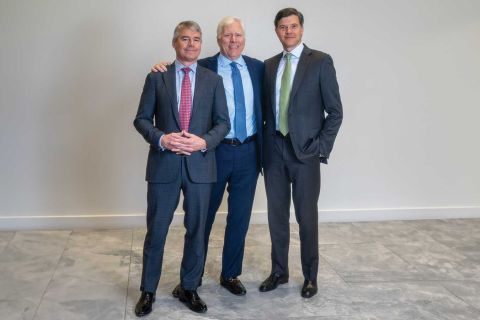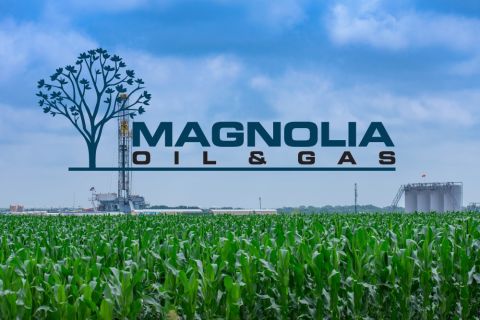Endeavour International Corp., Houston, has been formed by two well-known oilmen to try their luck in the North Sea. John Seitz, until last year the president and chief executive officer of Anadarko Petroleum, and William Transier, former chief financial officer of 1Ocean Energy, are the co-chief executives. Geologist Seitz was one of the key architects of Anadarko's exploration successes in the U.S. and abroad. Endeavour took a new name and went public recently by completing a reverse merger of a public shell named Continental Southern Resources and North Sea New Ventures, which Seitz and Transier founded in late 2003. The other members of the new management team also have equity in the deal. They held senior positions in business development or technical disciplines at either Anadarko or Ocean Energy and have worked offshore and internationally a collective 160 years. Focusing on the North Sea, the new firm has already made a significant seismic database agreement with Petroleum Geo-Services. This includes access to 3D Mega Merge, a data set that covers 79,200 square kilometers of the U.K. and Norwegian Continental Shelf. "To the best of the company's knowledge, no other firm has access to comparable seismic data of this size and quality," Seitz and Transier report. The start-up will buy properties and possibly companies. Its initial focus will be on the Central Graben area, which offers large reserve potential, proven play concepts and fallow acreage or blocks ripe for divestitures. As the majors leave the North Sea and more independents step in, Endeavour may face some stiff competition in its quest for assets. "We estimate there is $20 billion of capital looking to acquire assets in the North Sea, but only $2- to $3 billion for sale," Simon Ashby-Rudd, managing director of investment banker Waterous & Co., said at a Houston conference on M&A in the North Sea. "Such a material imbalance can only lead to higher asset prices." Asset values have risen 50% in the past four years, driven by small E&P firms and by European utilities seeking gas supplies. More than 30 U.K. start-ups are trying to acquire their first field in the North Sea, according to Ashby-Rudd. Although the U.K. independent sector was "decimated" in the 1990s through mergers and takeovers, the survivors are trying to regenerate growth as well. Kerr-McGee Corp. intends to remain a key player in the U.K. North Sea, according to chairman and chief executive Luke Corbett, despite recent negative changes in the U.K. tax regime. Speaking at a British-American Business Council program in Houston, Corbett said the exploration-oriented company considers the U.K. Continental Shelf one of its core areas. Some 48% of its global liquids production and 27% of its reserves are in the North Sea. It has interests in 20 fields there. "We've chosen not to abandon the North Sea, despite some worrisome trends. We remain prepared to act if the government offers new opportunities," he said. "It's always been known for being a harsh environment even beyond the financial situation, but for a company of our size ($10 billion in assets), with innovation, the North Sea can still offer rewards." The tax changes instigated by the U.K. government in 2003 dealt the industry an unexpected blow, Corbett added. "This was done more or less overnight, with no discussion or debate. It was a 33% increase in the tax rate and a $140-million impact to us. This was not incorporated into the economics of our projects, and it rocked our previous stability there." Another independent looking for acquisitions in the North Sea is Newfield Exploration. "Deal flow doesn't compare with the North American market, but it is still better than anywhere else in the world," said Bill Schneider, vice president, international. "We can dispel a few myths that may block potential buyers: that the government wants only majors to operate, you have to be part of the old boy's club, and only the owner of infrastructure can make money. These are not true." He admitted that chasing unsolicited opportunities "can be a long, hard slog." It has taken Newfield longer than anticipated to close a transaction, and it turned out to be a much smaller one at that. Direct-negotiated deals are not common, he added. He advised potential buyers to bring something of value to the seller or farm-out offerer, such as technical research or capital to fund activity that would not otherwise get done without your participation. "The North Sea has tremendous remaining potential. It resembles the Gulf of Mexico in 1989 when Newfield got started," he said.
Recommended Reading
Exxon, Chevron Tapping Permian for Output Growth in ‘24
2024-02-02 - Exxon Mobil and Chevron plan to tap West Texas and New Mexico for oil and gas production growth in 2024, the U.S. majors reported in their latest earnings.
Hess Corp. Boosts Bakken Output, Drilling Ahead of Chevron Merger
2024-01-31 - Hess Corp. increased its drilling activity and output from the Bakken play of North Dakota during the fourth quarter, the E&P reported in its latest earnings.
Petrie Partners: A Small Wonder
2024-02-01 - Petrie Partners may not be the biggest or flashiest investment bank on the block, but after over two decades, its executives have been around the block more than most.
CEO: Magnolia Hunting Giddings Bolt-ons that ‘Pack a Punch’ in ‘24
2024-02-16 - Magnolia Oil & Gas plans to boost production volumes in the single digits this year, with the majority of the growth coming from the Giddings Field.
Endeavor Integration Brings Capital Efficiency, Durability to Diamondback
2024-02-22 - The combined Diamondback-Endeavor deal is expected to realize $3 billion in synergies and have 12 years of sub-$40/bbl breakeven inventory.





